Accredited education is in high demand among refugees. A new pilot project sees 32 learners graduate with EU-certified education that opens unforeseen doors for the future.
Rwamwanja refugee settlement rarely experiences traffic jams, but today the main road is packed. Over 600 youth dressed in graduation gowns march towards a brighter future, bursting with pride.
Their graduation from FCA’s Business and Vocational Education Training Center has gathered an additional crowd of followers and special guests, even from the highest level of the Ugandan government.
“With this experience, I hope I can one day find somewhere to study”, says Rachel Ngenge Binwa, 18.
The Training Center has been running since 2015, but today’s graduation marks the first time that part of its graduates receive a diploma of global significance. Rachel is one of 32 students receiving a Finnish diploma in micro-entrepreneurship. During the ceremony, she is mentioned as one of the most successful learners.
“I developed interest in starting poultry farming, and at the end of the training my business was up and running”, Rachel says proudly.
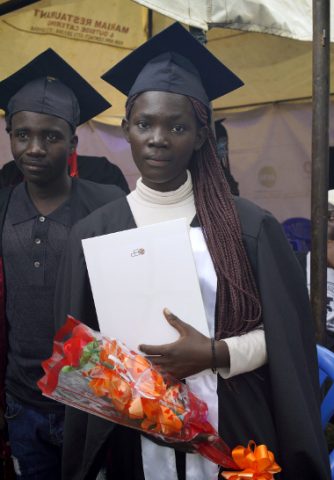
Rachel studied agriculture in the Business and Vocational Education Training Center before enrolling in the micro-entrepreneurship program. Now she has EU-certified secondary education.
The training programs for the Finnish diplomas build on needs and requirements of the private sector so that most find employment. Their competence has been assessed according to standards developed by the Finnish National Agency for Education, under a programme called FCA College.
The college was co-founded by Finland’s largest organisation for development cooperation Finn Church Aid (FCA) and the international education and training provider, Omnia Education Partnerships Ltd (OEP).
“Diplomas are recognised within the EU and open doors to applying for higher education even abroad”, says FCA College’s programme manager Ville Wacklin.
However, the immediate aim is that youth receive a strong endorsement for their actual skills.
“The education provided by development actors has mostly been informal, although most need accredited vocational education that leads to opportunities for decent livelihoods”, Wacklin continues.
There are more refugees than ever, and only about 20 percent of them have an access to secondary education. The challenge grows when most of the refugees are youth, whose futures are at stake.
Almost 70 percent of Rwamwanja’s 70 000 inhabitants are youth, and the situation is similar in other refugee settlements. This training helps them avoid a vicious cycle of unemployment and desperate ways of coping, like crime or radicalisation, Wacklin says. The program is also open for vulnerable Ugandan youth.
Already an overwhelming part of over a thousand learners that previously graduated from the training center have found employment. The Finnish diplomas for micro-entrepreneurs take learning to the next level.
Being able to access meaningful and recognized education during their displacement equip refugee youth to reconstruct their societies, when the time comes to return home.
“Every generation must have a fair chance to realise their dreams and contribute to national development. These diplomas give youth self-reliance and paths to a future, wherever they are and wherever they go.”
Text: Erik Nyström
Photos: Michele Sibiloni
Finn Church Aid (FCA) exports Finnish vocational diplomas to Uganda in cooperation with education export company Omnia Education Partnerships (OEP).
The diploma in question is an official Finnish vocational diploma, equivalent in its requirements to a Finnish secondary degree diploma.
The training programme is currently provided at a refugee settlement in Uganda. The first group obtaining Finnish entrepreneurship diploma at Rwamwanja refugee settlement are graduating on March 28, 2019.
There are more refugees in the world than ever, and it is estimated that only one in five will receive a secondary degree education. The average length of displacement is 20 years.
“What makes this programme exceptional is the fact that refugees are able to obtain a diploma while they are displaced, which helps them find employment already during displacement. A secondary degree education that is offered in crisis areas decreases dependence on aid and provides support where it is most needed”, says Tomi Järvinen, Director of International Cooperation at FCA.
In Uganda, FCA and OEP currently provide vocational diplomas in entrepreneurship. In the future, the plan is to also provide vocational qualification in education and instruction. The programme welcomes refugees as well as Ugandans to participate in the training.
Regina Meta, 18, fled to Uganda from Congo with her mother and sister in 2016, and is now studying in the Finnish entrepreneurship programme. With confidence gained from the programme, the young woman has opened her own hair salon, which is now among the most popular in the refugee settlement.
“Hairstyling has always been my passion. Thanks to the programme, I have learned a lot, especially about how to interact with clients. These days, I get lots of new clients based on the recommendations by my old clients”, Regina says.
Thanks to legislation that came into force in Finland last year, all vocational education providers have the opportunity to export vocational education, either as complete diploma programmes or as parts of them.
The reform is an important step forward for the export of Finnish education, and also a new form of sustainable development cooperation. It reinforces the ability of refugees to pursue their livelihood.
The project is a pilot that can be later used to provide vocational training in other refugee settings.
More information:
Ville Wacklin, Project Manager, tel. +358 40 719 0592
Tomi Järvinen, Director of International Cooperation, tel. +358 40 641 8209
Read more about FCA College here.
Translation: Leena Vuolteenaho
A smartphone and a connection to Finland revolutionised teaching at Pagirinya comprehensive school in Uganda. Teachers receive advice via the Whatsapp application, even in the middle of a work day.
How can one teacher manage a class with 130 pupils?
Maurine Anguezaru was faced with this problem about two years ago as she started as a teacher at Pagirinya comprehensive school. Thousands of refugees per day were coming to Northern Uganda from South Sudan.
”Upon arrival, the refugees were silent and shy, and some arrived without their parents,” she shares.
Advice came from her new smartphone, providing her with support in teaching-related challenges from a Finnish teacher. Mobile mentoring is a part of FCA’s teacher training.
Anguezaru says she has learned a lot from the advice and links shared by her mentor. The smartphone is her first, and thanks to her mentor, she has many new sources of information.
”Mentoring has made me more confident and better at spotting symptoms of trauma. I’m learning new ways to react to constant tardiness, rowdy behaviour or withdrawing,” Anguezaru praises the programme.
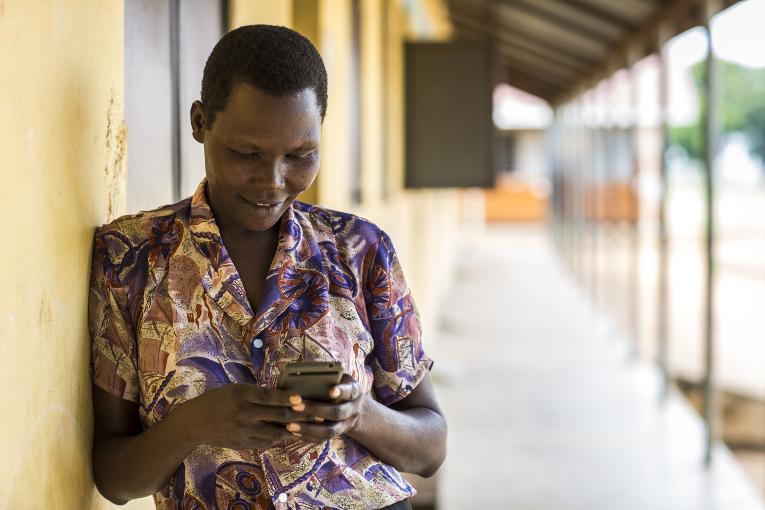
For teacher Sarah Atimaku, the biggest challenge at Pagirinya has been the language barrier between Ugandans and the South Sudanese. She herself speaks the language spoken by the South Sudanese, Arabic, and mobile mentoring has given her advice on how to help them follow the teaching in English.
Dialogue brings teachers together
In two years, FCA has offered mobile mentoring to a total of 120 teachers in Adjumani and Moyo. The teachers work in schools with both Ugandan and South Sudanese pupils.
The teachers go through teacher training provided by FCA in Uganda. They learn things such as pedagogy, acknowledging pupils’ special needs, and developing a curriculum. The learning is supported by Whatsapp groups, with a Finnish mentor giving advice to a set number of Ugandan teachers.
The Finnish teachers have also turned out to be active and committed to dialogue, says Roosa Laine, volunteer with the FCA-coordinated Teachers Without Borders network in Adjumani.
”They have also encouraged the teachers to ask questions. In addition, the dialogue has inspired the Ugandan teachers to collaborate more actively at school while planning their teaching,” says Laine.
”The programme has clearly increased these teachers’ pride in their profession.”
Mobile phones off during classes
The Whatsapp groups are not used for messaging while teaching a class, but during breaks between classes, urgent support is also available, depending on the mentor. Anguezaru’s group exchanges messages on a daily basis.
According to her, teachers may even record their classes to be assessed by others. For example, she has exchanged messages with Auli from Finland about the challenges she faced during geometry classes.
”I can say ‘hey, I’m having trouble with how to teach this topic.’ At the end of the school day, I can tell Auli how her advice worked,” says Anguezaru.
According to Anguezaru, the mentoring has clearly improved pupils’ performance at Pagirinya. She feels especially motivated by the change in the school’s atmosphere.
”The pupils have become very friendly, and I treat them like my friends. No one is left on their own.”
Text: Erik Nyström, Photos: Patrick Meinhardt
Growing up in Uganda’s biggest slum can label a person for a lifetime. Last week, 95 youth celebrated their graduation from Katwe’s Skills Center in Kampala, showing what can become of them when given a chance.
The air around the dusty field in the thick of Katwe’s slum area is bursting with excitement. White tents have been raised for a crowd of hundreds of viewers, including the 95 graduates from Katwe’s Skills Center.
They have completed their yearlong courses in photography, electronics and hairdressing, and are today dressed in their finest wear, including yellow robes and graduation hats. Finn Church Aid, The Finnish Ministry for Foreign Affairs and Muslim Youth Development Forum have supported their studies. Representatives from the local police authorities are also present to witness the students’ big day.
“This is sending everyone a message not to judge a community as a whole before you give them an alternative way of life”, says Ahmed Hadji, Team leader of the Muslim Youth Development Forum.
Youth yearn for a chance to prove themselves
Katwe is Uganda’s biggest slum area and widely known as a notorious haven for criminality, prostitution and recruitment of extremist groups. The reputation labels the community as a whole.
22-year-old Kaweesi Ramadan says it was impossible to find work before. Not only because
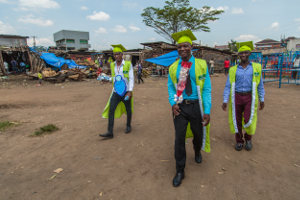
Kaweesi Ramadan, 22, (middle) says that from this day on, he is going to walk proudly on the streets of Katwe to show an example to other youth of what they can become.
he never had the chance to go to school, but also because he grew up in Katwe. His upbringing already deters employers.
“I had to do things that people do when there is nothing else. I stole people’s phones and used drugs”, Ramadan says.
Ramadan was at rock bottom when community leaders approached him about the training. He managed to leave his former life behind and powered through a yearlong education, specialising in electronics.
Project administrator Diana Akunda explains that the project also aims to connect the students with officials and police with the intention of letting them understand that change is possible.
“We invited local authorities on Friday sessions to witness the progress and at least make sure that they remember the faces of these youth who are determined to earn a living through work”, she says.
“When I see the youth today and compare with what they looked like at the start, I’m the happiest person.”
Training builds mental character
The training requires a lot of discipline from youth who never went to school, and who have to wait to earn money until after the training is completed. Nambalirwa Babirye, 22, says she was extremely shy when she joined, but after finishing her training as a hairdresser, she feels more comfortable socially.
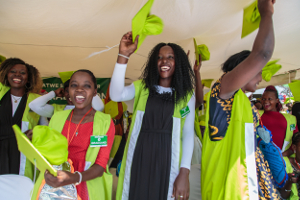
Nambalirwa Babirye, 22, (middle) celebrates becoming a hairdresser. Her dream is to start a saloon for celebrities.
“I grew up with a single-mom and had to quit school after the first grade because she could not afford it. I am so excited about finally learning skills that I already started teaching children what I know”, she says.
“I want to improve children’s lives, and personally I dream to start a saloon for dressing celebrities.”
Ramadan has learnt to repair electronics and create innovative technical solutions in an environment where creativity is much needed due to the lack of money. At the graduation event, another student displays a fully working helicopter he’s built during the training. The photography students have also decorated the venue with breath taking pictures.
Graduated electricians receive a toolkit worth 50 US dollars to help set up a business, while photographers and hairdressers are supported in establishing studios, saloons and spas.
“From this day, I will be walking proudly on the streets of Katwe to show what we all can become when given the chance to prove what we are capable of”, Ramadan says.
After a round of musical performances and inspirational speeches, the student’s receive their diplomas and cut the graduation cakes. Plenty of flowers are handed out, and when the speakers start blasting hit music, all 95 students spontaneously start dancing and singing along. The atmosphere is electric.
“This is the first time they celebrate something. There’s been years of negative attention for them, but now it is positive. I am so excited about this”, Hadji says.
Text: Erik Nyström, Photos: Sumy Sadurni
A group of 19 NGOs call on international donors to share responsibility and increase funding.
Statement signed by
Action Against Hunger, Adventist Development and Relief Agency (ADRA), BRAC, CARE, Catholic Relief Services, Danish Refugee Council, Finn Church Aid, Finnish Refugee Council, Food for the Hungry, Humanity & Inclusion, Mercy Corps, Norwegian Refugee Council, Oxfam, Save the Children, Tutapona, Voluntary Service Overseas (VSO), War Child Holland, World Vision, ZOA
One of the biggest biometric verification processes ever undertaken has confirmed that Uganda is hosting 1.1 million refugees, by far the largest number in Africa and the third largest worldwide. With the scale of the crisis now confirmed, the international community should ensure the response is appropriately funded. As the end of the year approaches, the 2018 response plan has received just 42% of the required funds.
Since March 2018, the government of Uganda and UNHCR have embarked on a biometric verification exercise aimed at validating and updating the total number of refugees in Uganda. This process has been essential to confirm numbers, which are lower than previously reported, and must be the start of a renewed long-term commitment to provide an adequate and well targeted response to the largely unmet needs of refugees and their host communities.
We look forward to a consolidated and unified refugee database that will support protection, identity management, well-targeted provision of assistance, and awareness of accurate population statistics. All of this is necessary to ensure better support, service delivery and durable solutions for refugees and their host communities in Uganda.
Uganda cannot handle this crisis alone. Uganda’s refugee policy is one of the most progressive in the world and the country has continued to welcome refugees at a time when many countries are shutting their doors. The support from donors so far is welcome and has helped save lives and provide services; but is falling far short of what is needed.
The international community has not kept its own commitments made in the 2016 New York Declaration to share the responsibility and provide enough funding. In our daily work we see the impact of this: more than half of children are out of school; sick and pregnant women walk miles to reach health clinics that lack beds and medicine; poverty and need leaves girls vulnerable to sexual exploitation and forced marriage; families queue for hours to try and get water; and frustrated youth have no jobs or hope for the future, as evidenced by a recent increase in suicides in some settlements.
We recognise and echo donor calls for accountability and are committed to measures that prevent and combat all types of wrongful conduct, including fraud, corruption and Sexual Exploitation and Abuse. However, continued failure to provide funding will lead to a further decrease in assistance for refugees, more than 60 percent of whom are children, and host communities. The influx has put enormous pressure on host community resources, with far-reaching political, economic, social, developmental and humanitarian consequences.
The humanitarian community in Uganda is committed to supporting refugees’ resilience and self-reliance, but further cuts to services such as food rations, water provision, healthcare and education could exacerbate tensions and generate violent conflict.
Uganda’s refugee policy is held up worldwide as a good example, so what happens next in Uganda will have global implications for how the world deals with refugee crises. A failure to support refugees and host communities here will jeopardize the credibility of the Comprehensive Refugee Response Framework and the forthcoming Global Compact on Refugees. At a moment in time when the international community is setting out a new way of working and sharing responsibility, Uganda is the test case which cannot be allowed to fail.
We therefore urge international donors to:
– Recognise the verification exercise as the first step in committing to ensure a fully comprehensive and effective response to the refugee influx in Uganda
– Fulfill their commitments made in the New York Declaration to share responsibility for responding to refugee crises and urgently provide funds to meet the verified levels of needs
– Follow up on outstanding actions under the Joint Action Plan, ensuring that investigations of allegations of wrongful conduct are concluded and reported against
– Commit to upholding the quality of asylum for refugees by meeting their lifesaving needs through predictable multi-year funding and investment in infrastructure in order to achieve the minimum standards in the provision of multi-sector assistance and protection
– Step up efforts to find durable solutions to the crisis, including though committed international political action to end conflict in countries bordering Uganda
Download the NGO joint statement in pdf-format here. Read more about Finn Church Aid’s work in Uganda here.
Finn Church Aid (FCA) doubled the capacity of its training center in Rwamwanja refugee settlement, meeting the growing demand for vocational skills in the settlement and host community.
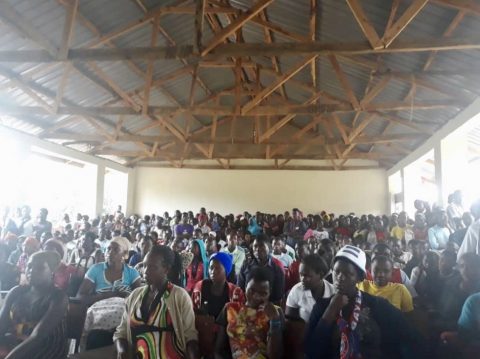
New students from Rwamwanja refugee settlement and the host community gathered for orientation day in late August. Photo: FCA/ Lilian Musoki
FCA has completed infrastructural developments for its Business, Technical and Vocational Education Training (BTVET) in Rwamwanja refugee settlement, Uganda.
The capacity boost enabled the enrolment of 500 new trainees – the biggest number ever for the six-month training. The growing demand for vocational skills is evident. This summer, the project received 2 481 BTVET applications from the settlement and host community.
“I am glad I was selected for the course of tailoring. I cannot wait to improve my standards of living by earning my own money, without depending on handouts”, says Irafashe Jean, one of the new students, who took part in the orientation sessions in late August.
Vocational education for youth aged 15–25 years
Earlier, the centre could only take on 250 trainees per intake. In scaling up the number of refugee and host community students with UNHCR funding, the project constructed two Community Based Training centres and added two classroom blocks to the existing one at Nkoma.
Moreover, 90 youth have been enrolled for three-month courses at the Community Based Training centres, which limit walking distances to the training. The selection criteria is based on protection concerns, such as unaccompanied minors, child headed households, teenage mothers and persons with special needs. This brings the total intake for August 2018 – January 2019 to 590 youth.
The project continues to provide training for youth out of school aged 15–25 years. The skills provided as selected by the youth are based on the market assessment.
Earlier this year, 250 youth received skills in five six-month courses, including textile and garment cutting, agricultural training, hairdressing and cosmetology, blacksmith welding and sandal making.
The project’s target is to reach 840 youth by close of 2018. The project will continue to follow up on trainees after the training, provide counselling and link trainees to potential employment through personal entrepreneurship and private sector jobs.
Read more about Finn Church Aid’s work in Uganda by clicking here.
Four major international NGOs launch an innovative and ambitious new education project, aiming to get thousands of out-of-school refugees and Ugandan children back into education.
 The INCLUDE project will use accelerated education methods to teach children who have missed out on years of school. It provides interactive computer games to promote learning, helps children who have fled war to cope with the stress of their experiences, and engages communities to identify their own priorities for improvement.
The INCLUDE project will use accelerated education methods to teach children who have missed out on years of school. It provides interactive computer games to promote learning, helps children who have fled war to cope with the stress of their experiences, and engages communities to identify their own priorities for improvement.
The project is developed by the new Education Consortium, which is led by Save the Children alongside Finn Church Aid, Norwegian Refugee Council and War Child Holland thanks to a €3 million humanitarian grant from the European Union.
Uganda hosts the largest number of refugees in Africa and one of the largest numbers worldwide. More refugees continue to arrive every day and more than 60% are reported to be children.
More than 350,000 refugee children (57% of the total number) are now out of school.
The Government of Uganda and local communities have shown tremendous hospitality in opening their doors to refugees who have fled horrific violence and suffering, but the influx has put severe strain on local resources. Schools which were already overcrowded and short of teachers and basic resources are now under increasing pressure.
At least 171,000 children in local host communities (34% of the total) are also out of school.
The INCLUDE project will start work in West Nile, with children aged 10–18. Many have had to drop out of school because they can’t afford to attend, or because they have been separated from their families, have to work to support their relatives or have themselves become child mothers.
European Commissioner for Humanitarian Aid and Crisis Management Christos Stylianides says:
“Education is not a luxury, it is a basic right that gives children the tools, support, protection and hope for a better future for them and their community. Each child has a right to learn, whatever the circumstances. Preventing lost generations is our collective duty.”
“The EU is a leading voice in education in emergencies. Since 2015, we have consistently increased our humanitarian funding for education in emergencies, and next year we aim to increase it by a further 2%, reaching a 10% allocation of the overall aid budget in 2019. This allocation will be 10 times more than the allocated budget in 2015.”
Lisa Parrott, Acting Country Director for Save the Children in Uganda says:
“With hundreds of thousands of children out of school, the scale of the education crisis requires new approaches and new ways of working. By joining together and using innovative new ways of teaching and learning, we can achieve so much more.”
“Education is vital to give these children the chance of a better future. Refugee children can make a valuable contribution to Ugandan society and to building a prosperous and peaceful South Sudan, but they need to be given the chance to fulfil their potential. Host communities have generously welcomed refugees, and it’s essential that they receive a decent education as well.”
The INCLUDE project makes use of technology and innovation to implement four different components:
- Accelerated Education, which uses a specially designed and condensed version of the Ugandan curriculum to speed up learning for children and youth who have missed out on years of school. By covering two to three grades of primary education in one year, and using teaching methods appropriate for different age groups, the programme helps children transition back into the formal schooling system.
- Can’t Wait to Learn is an innovative technology-based solution for quality education, especially tailored for children affected by conflict. It provides classrooms with tablets loaded with interactive games that help teach literacy and numeracy. The games make learning fun, engaging and more effective.
- Team Up is a series of recreational activities that are designed to reduce the stress that refugee children experience as a result of war, their difficult journeys to safety and life in a new country. Many of these children have seen horrific violence, which could scar them for years to come. Team Up activities strengthen the cognitive, physical, emotional and social development of children through sports, games and body movement.
- ILET (Improving Learning Environments Together) encourages communities to participate in improving the quality of education, through a series of assessments that are designed for humanitarian contexts and empower teachers, parents and learners to set their own priorities for school improvement.
By working closely together and combining technical expertise, the Education Consortium will be able to have a bigger impact for out of school children and provide greater value for money.
For more information, contact:
Rachael Corbishley, Education Consortium Manager, rachael.corbishley@savethechildren.org
Alun McDonald, Head of Advocacy and Communications, Save the Children alun.mcdonald@savethechildren.org
Learn more about Finn Church Aid’s work in Uganda by clicking here.
In June, graduations were celebrated in Uganda as well, as 20 graduates of a Finnish entrepreneurship training received their diplomas. This is the first time that it has been possible to complete a Finnish secondary vocational education in Uganda.
The project carried out in cooperation between Finn Church Aid and education export company Omnia Education Partnerships aims to offer entrepreneurship education to both refugees in Uganda and young Ugandans.
Uganda is the third-largest recipient of refugees in the world. There are currently almost 1.5 million refugees in the country.
”Education export like this has not been carried out in Uganda before. An official vocational qualification opens up doors to further education for the graduates. The qualification allows them to apply for institutes of higher education within the EU, for example,” says Finn Church Aid project manager and instructor for the project, Ville Wacklin.
This is an official entrepreneur’s further vocational qualification, equivalent in its requirements to a Finnish upper secondary level degree. In addition to improved prospects of employment, completing the qualification certifies the graduate as a trainer who can train others wanting to become entrepreneurs in the future.
Dreaming of international markets
Last week, the Finnish Entrepreneurship Diploma was granted to 20 students, five of whom are refugees living in Uganda, and 15 Ugandan citizens.
One of the graduates is 25-year-old Ugandan Doris Akampurira. Empowered by the education, she has founded her own online store through which consumer goods and groceries can be ordered straight to one’s door step.
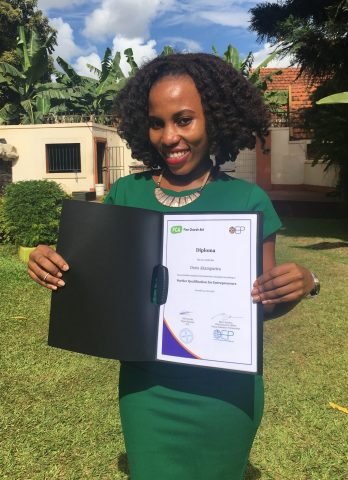
Empowered by the training, Doris Akampurira, 25, realized a long-time dream and established her own online store.
”Even though I had dreamed of entrepreneurship for a long time, I was hesitant to start my own business. Thanks to the training, I gained enough courage to take the final step. Now I dare to take calculated risks and I know what it takes to be an entrepreneur,” Doris says.
It all started from an idea that online shopping is the future.
”I want to make buying easier for people. The idea of my business is that customers can shop in the comfort of their home and have their shopping delivered straight to their door step,” Doris says.
The young businesswoman’s ambitious aim is to make her business known abroad as well.
”My dream is that in five years, everyone knows my online store, and that it’s one of the biggest in Uganda. One day, I hope to expand my online store even beyond Ugandan borders,” plans Doris.
26-year-old Joseph Lohose arrived in Uganda five years ago as a refugee. The entrepreneurship training has given him faith in the future and helped the young businessman to develop his business ideas.
”Personally, the qualification is a huge achievement for me. People have lots of preconceptions about refugees. It’s not easy to make it in a foreign country. Now I can apply for further education and realize my business plans”, Joseph says.
The successful pilot project is planned to continue in the fall, when the training hopefully commences on an even larger scale than before. At the moment, there are 60 future refugee entrepreneurs studying to attain the Finnish Entrepreneurship Diploma at a refugee camp in Kampala.
The joint-project of Finn Church Aid and Omnia Education Partnerships was carried out in cooperation with Savon ammattiopisto, Kauhavan yrittäjäopisto and Kauppiaitten kauppaoppilaitos Mercuria.
More information: Ville Wacklin, project manager, FCA, tel. +358 40 719 0592
Translation: Leena Vuolteenaho
Jonaliese, Sauda and Daphe found a direction for their lives at FCA´s vocational school in Uganda. Thanks to their exceptional motivation, the young graduates from FCA´s school face no difficulties in finding work.
If someone had asked 20-year-old Jonaliese Karsugho where she will be in five years’ time, she would have hardly thought that she would be instructing a final project in metalwork at a Ugandan refugee settlement.
But here she is at the age of 25, in the middle of a metal workshop, dressed in a pink dress, going over the instructions of the final project in her native language of Kinyabwisha, for a group of young men.
Jonaliese’s future plans were altered by the war.
She escaped the violence in Congo to Uganda with her sister in 2014. Rebels killed Jonaliese’s parents. Amidst the chaos, her third sister disappeared. To this day, Jonaliese does not know whether her sister is still alive.
At Rwamwanja refugee settlement, Jonaliese supported herself and her younger sister first by cultivating land. One day, she saw an advertisement for a course organised by Finn Church Aid (FCA). After taking the farming course, the following year Jonaliese was accepted as an assistance leader for a metalwork course. As a result, she is now watching attentively as 15 students start hammering a sheet of metal into a toolbox.
Soon the air is filled with a horrific sound of banging metal hammers. We have to leave the classroom.
From a refugee to a barber
73 % of the young people trained by FCA find work
Rwamwanja refugee settlement was founded in the 1960’s to settle refugees of the Rwandan genocide. The settlement was closed for a few years, until unrest in Congo flared again in 2012.
FCA founded a vocational school in the area in 2015. Most of the young people participating in the vocational training have lived at the camp for 3-5 years. Out of the young people who have completed the training, an impressive 73 percent have either found employment or started their own business.
There are about 63,000 refugees living at Rwamwanja refugee settlement, most of whom having escaped the civil war in the neighbouring Congo. One of the biggest problems of the settlement, with a population roughly the size of the city of Vaasa, has been youth unemployment.
”When young people had nothing to do, they would just drink and gamble,” says FCA project coordinator Caphas Mugabi.
FCA started working at Rwamwanja three years ago by first mapping which professions the young people should be trained for, in order for them to have good chances at finding work. The first courses started in May 2015, training the youth to be construction workers, engine repairers, tailors, cooks, metalworkers, and barbers.
250 students are selected for the six-month long training twice a year. There are more applicants than there are openings, and the students are selected based on applications and interviews. Both refugees and young Ugandans are admitted into the training.
”We do not care about previous studies, since many have been forced out of school due to the war. What we care most about is motivation. Many of the young people are in a desperate need for training and work, for example in order to support younger siblings after their parents have died,” says Mugabi.
Finding work is the main goal of the training. The studies include an internship, learning about finding a job and entrepreneur skills. The results have been excellent. A total of 73 percent of the graduates have either found employment or started their own business.
”We feel as if our work here truly changes the lives of these young people,” says Mugabi.

Sauda Tusingwire found her calling at the FCA vocational school. ”I’m happy that I have a plan and a future now”. Photo: Fredrik Lerneryd
Clothes for twelve siblings
The clamour of the metal workshop eases a little as we cross the yard to another classroom. Here the air is filled with the buzzing of sewing machines, as some twenty young people are sewing the seams of skirts as part of their final project.
Sauda Tusingwire, 21, looks like a professional using her sewing machine. It is hard to believe that she first tried using a sewing machine only six months ago. The elegant dress Tusingwire is wearing is also designed and sewn by her.
”Although I was interested in becoming a tailor and I had lots of ideas for clothes, I didn’t know anything before starting this school,” says Sauda.
In addition to sewing her own clothes, Sauda has sewn clothes for her twelve siblings. For the children of a single father, the clothes sewn by their sister have been very welcome.
”However, the most important thing to me has been that I have been able to make money by selling the clothes I have made at school. My dream is to start a big business,” says Sauda.
”I also want a family, but not until I have started my business.”

Jonaliese Karsugho dreams about starting her own enterprise. Photo: Fredrik Lerneryd
Student counselor helps find work
Young people from harsh circumstances need additional support. They are assisted by FCA´s student counsellor Olivia Nazzawi. She visits the students and graduates regularly. After graduation, Nazzawi’s task is to help them find employment or start their own business.
”My job is to encourage and support them. At a refugee camp, it is easy for people to become passive and give up. It is then my task to say that you have no choice. You have to work,” says Nazzawi.
For example, graduates of farming studies are provided with a plot of land and farming equipment by the school. They can sell their crop at the marketplace or at a store and earn a living.
The employment prospects are brightest for construction workers, since there is a great deal of construction going on in the fast-growing area.
At the start of their career, graduates of catering studies may be offered a job at a small restaurant founded by FCA, and in addition, many have found employment at other restaurants in the area. Aside from the restaurant, FCA has founded a repair shop in which young people can gain work experience and earn money.

Wilson Kiiza loves his job as a mechanic. ”The thing I love the most is when I sometimes get to test drive the motorbikes.” Photo: Fredrik Lerneryd
”Now I can do something others can’t”
Last year, the most popular courses were those for hairdressers and tailors. Daphe Nantesa, 17, weighed between the two courses after she heard about the school from a teacher visiting her village. Daphe applied and was selected for hairdresser studies, which turned out to be a good choice for her.
Daphe has calculated that for one customer, she needs to buy hair salon materials for 10,000 Ugandan shillings (which equals roughly 3 euros). She can then charge the customer 30,000 shillings (approximately 8.5 euros).
”In this work, not a lot of initial assets are needed, and I don’t have to move anywhere, since the customers and their hair come to me,” Daphe smiles.
Daphe is Ugandan, and has seven siblings. Before the training, she felt as if there was nothing special about her.
”There was nothing that would have distinguished me from others. Now, after completing the training, I can do something that not everyone can!”
After graduating, she plans to work hard and save up the money, in order to be able to open her own hair salon one day. There, in her own business, she could teach young people as well.
”I want to give others the same opportunity to change their life that I’ve been given through the training,” Daphe says. For many young people, school has sparked a needed boost for their self-esteem.
For Jonaliese, who escaped from Congo four years ago, the training offered an opportunity to earn more money and start planning her future. If Jonaliese could decide, where would she be in five years’ time?
”I dream of a big business where I could train young refugees and offer them jobs. I want to provide young people with a chance to lead an independent life,” Jonaliese says.
Text: Noora Jussila
Translation: Leena Vuolteenaho
Photos: Fredrik Lerneryd
Read more about FCA’s work in Uganda.
Finn Church Aid handed over the completed structures to the beneficiaries and local government in Bidibidi and Omugo refugee settlements.
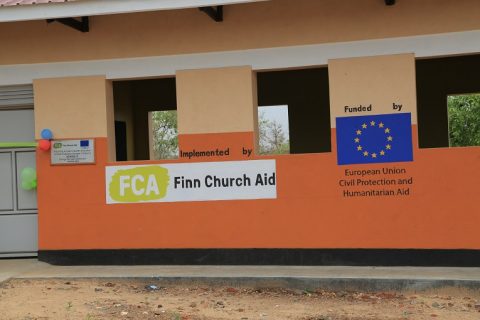 A major improvement in the education of children and youth began with the opening of 34 newly constructed school blocks in Bidibidi and Omugo refugee settlements in Northern Uganda.
A major improvement in the education of children and youth began with the opening of 34 newly constructed school blocks in Bidibidi and Omugo refugee settlements in Northern Uganda.
FCA built 102 classrooms, 28 latrine blocks and 65 teacher houses with EU humanitarian funding to provide a conducive and safe learning environment to the vast number of children in the settlements.
The children celebrated the handover in separate ceremonies in the presence of government officials, UNHCR, refugee community representatives and parents.
Over 60 percent of the South Sudanese refugees are under 18 years old. Many have thus far struggled in temporary structures like tents that heat up quickly during sunny days, and are vulnerable to extreme weather conditions. The newly finished buildings are semi-permanent and safe.
In addition to the structures, FCA has trained 108 teachers in dealing with children in a crisis context. A total of 400 teachers are to be trained during the project. The teachers and child protection committees also received bicycles to support them in their roles in ensuring child protection in both schools and communities.
Read more about Finn Church Aid’s work in Uganda here.
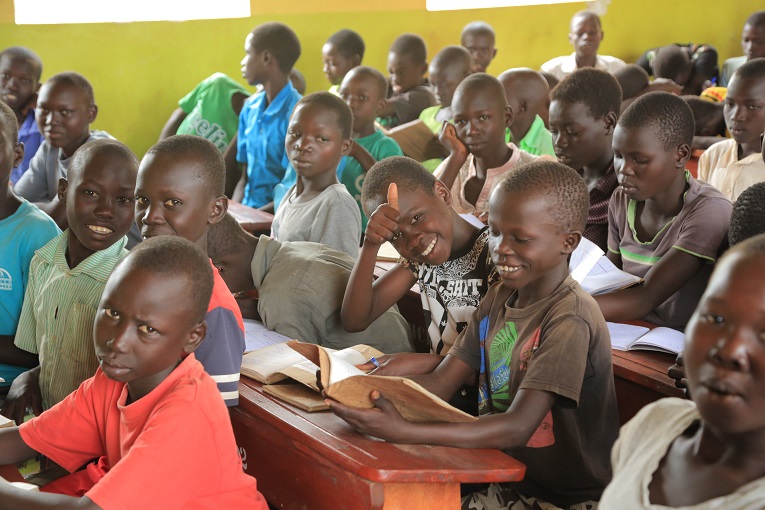
The completed classrooms provide students with a safe environment for learning.
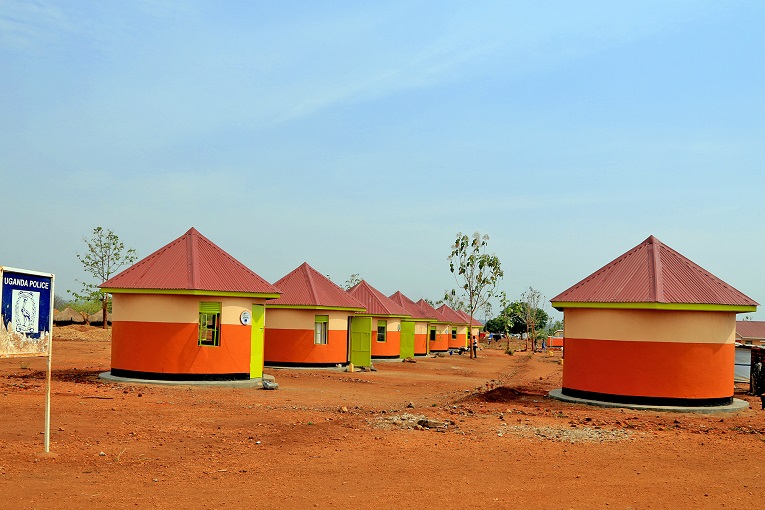
To address the high demand for teacher accommodation, FCA recently constructed an additional 25 tukuls for teacher accommodation across 5 schools in Bidibidi.





 The INCLUDE project will use accelerated education methods to teach children who have missed out on years of school. It provides interactive computer games to promote learning, helps children who have fled war to cope with the stress of their experiences, and engages communities to identify their own priorities for improvement.
The INCLUDE project will use accelerated education methods to teach children who have missed out on years of school. It provides interactive computer games to promote learning, helps children who have fled war to cope with the stress of their experiences, and engages communities to identify their own priorities for improvement.



 A major improvement in the education of children and youth began with the opening of 34 newly constructed school blocks in Bidibidi and Omugo refugee settlements in Northern Uganda.
A major improvement in the education of children and youth began with the opening of 34 newly constructed school blocks in Bidibidi and Omugo refugee settlements in Northern Uganda.
